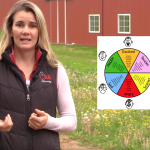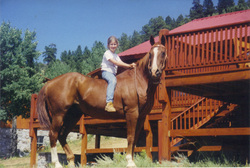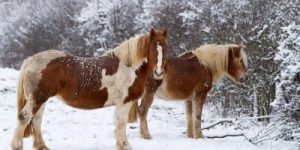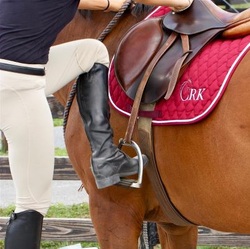Today we are discussing a topic that, at first glance, may seem a bit strange for a riding video… the idea of self awareness. Last week I shared about the importance of “body awareness” and how being more aware of our bodies through other forms of exercise or movement can improve our riding.
In this video, I will share how more self awareness can help us control our emotions, notice our behaviors, and acknowledge our strengths, weaknesses, and mental states. Why is this so important for riding? We can set ourselves up for success in our own learning, as well as make better choices about how to interact with our horses.
Watch the video below and I look forward to your comments!
Callie
p.s. I actually filmed this video early and had it all ready to release today, and what perfect timing as today was the start of a “Natural Lifemanship” clinic here at my farm. I agreed to host the clinic for a friend of mine who provides equine therapy, and wanted to learn from Tim Jobe and his method of equine therapy. I didn’t know what to expect from the clinic but took advantage of the opportunity to participate. I have already gotten so many insights into the deeper levels of training and relationships – it is starting out as an amazing event and perfectly related to this week’s video!














12 Responses
I am relatively new to horsemanship. The most unexpected and delightful part of this experience has been the spiritual component of working with horses. The process stretches me to places of discomfort and uncertainty, eventually revealing deep satisfaction. Horses don’t deceive and they call us to an honest appraisal of ourselves and who we are in relationship to them. I appreciate the call to acknowedge the self.
Hi
I have to agree that when you find yourself angry or stressed, ask yourself, Why? I find I often get two answers. The first answer, I’m angry at so and so. The second answer comes later after a little reflection. I’m angry at so and so, not because they actually did anything wrong, but because when they said this it reminded me of that, and that other thing is what I’m actually angry about. I generally feel better when I understand WHY I had a reaction, and it also helps me separate things or people that accidentally or unintentionally triggered my anger from the things themselves.
This is also useful when you find yourself doing things you know you shouldn’t be doing. Why am I driving so fast on this winding road? I’m stressed and this is an expression of that. Once I can decouple those two things and understand them, I can more easily stop the dangerous or self destructive or self defeating behavior.
If you’re going to put another living thing under your control, first you need to have control of yourself. Once you learn why you react negatively to certain things, you are more able to not let those things control you and make you react or behave in ways which are not helpful or can even be damaging to you and the horse. And damaging to anyone else, especially younger people, who’re depending on you for leadership or guidance or help. First, master yourself. Not an easy task. It is a lifetime of work.
Wow,Mike! I agree with you wholeheartedly and all counts. A betrayal from a friend 15 years ago touched an unbeknownst to me festering childhood hurt\wound. Though a wise person in my life told me that, it took me 6 months to let go of the anger and I subsequently realized that a lot of the anger I feel today is an overreaction to a past hurt. It’s been extremely helpful to take a second look at all of my emotions and not take them at face value, whether with people, in a car, or on a horse. Thank you for the reminder and Callie, thank you for this important post!
Bravo Mike! Your comment really resonated with me, especially your two levels of response to stress/anger and your suggestion to decouple the stress response from the cause. This is great advice. Thanks to you, and to Callie for raising such an important topic.
self awareness is always important. I learned this a long time ago over some other personal issues. Today, I learned how important this is while riding. I have a new mare, Zara, who is 4 yrs old and green broke. I have a trainer who is working with me to help finish her. We have had a lot of rain, so our riding field is quite muddy and slippery. As we were riding in the farthest end from the stables, there were some goats grazing down the grass and weed in a fenced off area (it’s got a deep pond and lots of geese and ducks). On our way out, I spent a little bit of time letting Zara look and the fence and the goats, but she was more interested in what the arborists were doing (trimming trees). After about 30 minutes, we started back to the barn. As we came around the corner of the goat area, Zara finally noticed the goats. Just seconds before, I was thinking about how my body and emotions were – am I tense in any way? where are my heels? I moved my shoulders in circles, put my heels down and noticed how much more that relaxed me and I got a better seat in the saddle. And just in time, too, because when Zara saw those goats, she bolted and wanted to run away. But I was able to stay mounted (due to a good neutral pelvis), keep presence of mind with what Zara was doing and how to keep the situation from escalating into a disaster. I got her to settle down and we spent about 30 seconds just looking at the goats. Then I walked her in a large circle, stopping where she could look at the goats. By this time, she was doing much better – still nervous, but controllable. My trainer took his horse over to the goats and moved them off. I made Zara walk toward the goats as they were walking away from her. I think this made her realize that goats are things she can herd along and not to be afraid of them. Without my self awareness I could not have been calm and speak calming words to Zara and I most certainly would have hit the ground. This was a first for me. And it was a real confidence builder, too. The trainer was very pleased with how I handled the whole thing.
Thanks Callie, for this very important video. I love how diverse you take your topics. It seems to me that everything we do and are is tied profoundly to how we interact with our horses and how it makes them feel. I feel so very fortunate to have your insights as another resource in my quest to become a better horsewoman. Thank you so very much!!!
I agree with everything being said. I am a person who has been self aware most of my life and by doing so have been able to change myself to be the person I wanted to be. However, it is common that most people who are not self aware are often this way because they are also people who do not take responsibility for their reactions, emotions, words they have spoke etc. So if these people ask themselves questions to become self aware they will answer these questions by blaming the horse, the weather, the coach, a friend, the time of the month, a cold, etc. Becoming self aware also entails having the maturity to take responsibility for your reactions, feelings etc when answering those elf awareness questions you must ask yourself.
Thank you Callie, love your videos, help and insight – you are a true Equine Angel to us all!
I have been practising some dressage and refining my aids in-between lessons with my instructor and last week was very keen to “show off” what we could do to my instructor in my next lesson, however my beautiful horse that day had other ideas and was very spooky, speedy and completely unconnected with me during my lesson with my instructor. I felt very frustrated but my instructor said to me and I think it is really helpful to keep in mind when we ride, she said “Ride the horse you have today” . With that in mind our lesson took a different turn and we worked on completely new and different things and ended up learning heaps! Sometimes we put too many expectations on ourselves and our horses and if we can keep an open mind and ask and listen to the questions that we and our horses have, even the so say frustrating days we can turn into progress and new adventures! I write a riding journal (inspired by Callie) and have added “Ride the horse you have today” at the top of the pages to help me remember that it is a partnership at it’s best when we listen and learn from each other.
I must say this is a very good topic in relationship to horses. My experience has been that I sometimes find myself “losing my temper” with a horse or that everything just feels like a mess because I’ve let myself get so wound up over that the horse won’t do this or that. Luckily what’s happened more and more is that I realise what I’m doing and at first I could just call it a day instead of persisting for much longer than was good for me or the horse in trying to get something done. After a little while I started thinking why (it’s all in the why) am I losing myself over this little problem? And I found that the anger was actually frustration and the frustration was actually a lack of knowledge of how to change things and do them differently.
Thank you Callie for being one of the people who help me gain knowledge in this process!
In past video blogs you have recommended ending each training session with the horse with something positive, something the horse does well. I have applied this to myself and try to end on a positive note for both of us.
I also know that if I’m tired I’m irritable and I do better to keep training very simple or maybe just spend some downtime grooming instead of riding. Thanks again for another insightful video.
Excellent topic Callie, very interesting, insightful and thought provoking. Great insight Mike, you gave me some things to ponder more deeply that I really needed to hear. Look forward Callie to hearing more about natural lifemanship as well.
Good reminders Callie. I have a horse that has been a challenge. His most recent challenge is going vertical. A few years ago, I was injured on a horse that went vertical, so the fact that mine is currently doing this, makes me extremely nervous. It only happens when mounting, so that is how my ride is ready to start. Fortunately I have gotten some help / tools to work him through this and yesterday it worked very well. I absolutely must be in the right frame of mind before I get on him. Confident, calm and focused. It is a mental game I play with my self before getting on him. If I am not ready to do this, I will not get on him. Self-awareness is key as we work through this.
Thanks for a great article Callie. Self awareness is a skill that would be so great to suddenly acquire, but of course it doesn’t come that way. It is a practice that develops over time. Thanks for the great tips and advice on how to develop it.